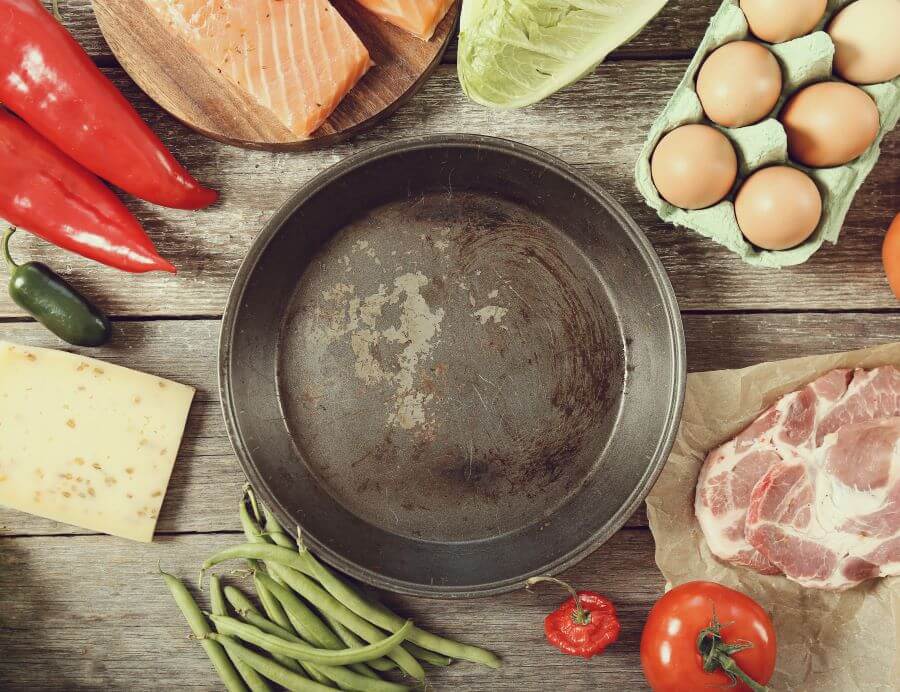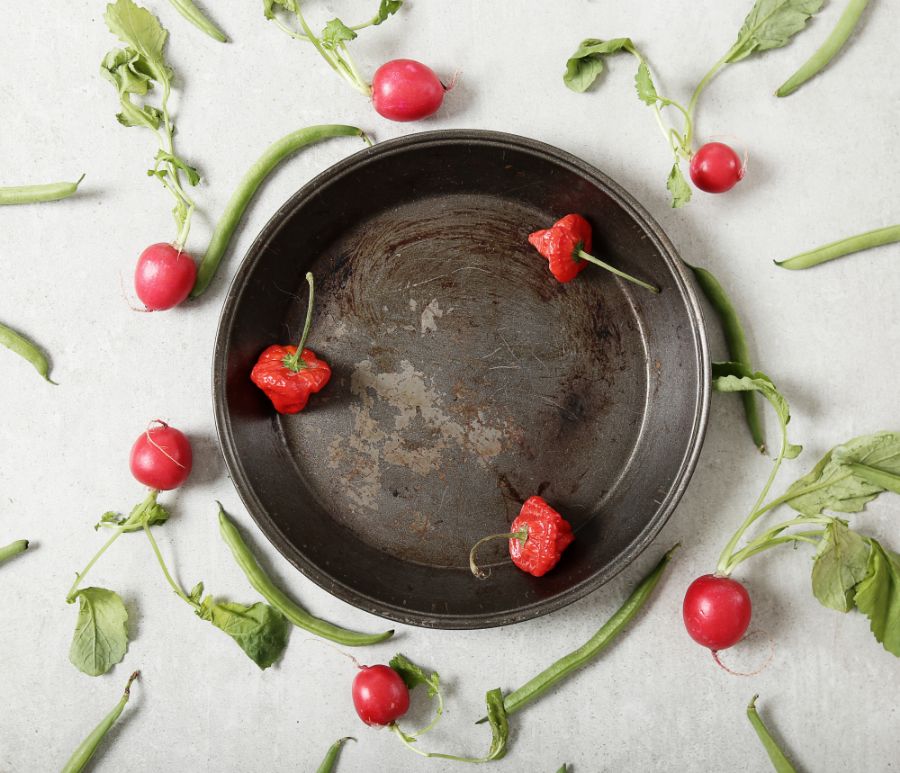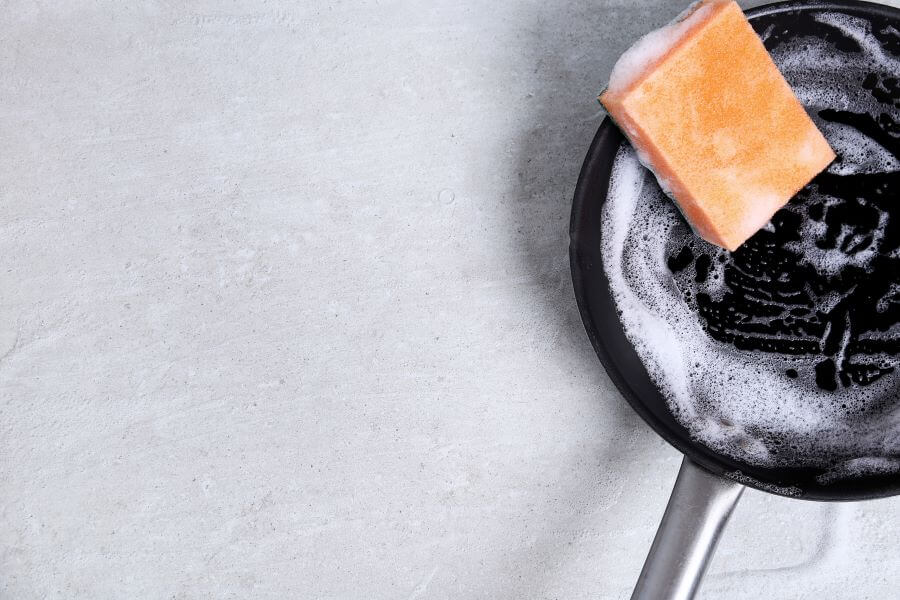Cast iron cookware has been used for centuries. It is also generally considered safe for cooking. However, it can become a concern when tiny, black flakes start peeling off your pots or pans.
This doesn’t have to mean your pan is ruined. Cast iron flaking is a common problem. Find out if cooking with such flaking cast iron is still unsafe. Also, what can you do about it to ensure kitchen safety?

Is Flaking Cast Iron Safe For Cooking?
Flaking cast iron cookware happens when the seasoning layer of cast iron pans or pots deteriorates or is damaged. Seasoning is a layer of polymerized oil that is baked onto the pan.
It provides a non-stick surface and helps prevent rust on the cast iron. When the seasoning breaks down or peels off in small flakes, it can create uneven cooking surfaces. It also exposes the cast iron lying under.
Proper maintenance and regular seasoning can help prevent flaking in cast iron cookware. As for the question, is flaking cast iron safe? The answer is simple. Flaking cast iron cookware is generally not unsafe for cooking.
However, If the seasoning on your cast iron pan has deteriorated to the point where it’s flaking or chipping, it’s best to strip it.
You can then re-season the pan before using it again. Cooking with flaking cast iron can lead to ingesting tiny bits of iron or seasoning. This may not be harmful in small amounts, but it is not ideal for your health.
Properly maintained and seasoned cast iron cookware is safe for cooking and offers excellent heat retention and even cooking.
Why Is Flaking Cast Iron Unsafe For Cooking?
Risk of consuming Seasoning Flakes
When the seasoning on cast iron flakes off, there’s a risk of consuming these tiny bits of seasoning along with your food. These flakes are carbonized oils or fats, so consuming these in small amounts may not be harmful.
However, it is still not ideal for your health, and ingesting larger flakes can be unpleasant. If the cast iron is damaged or chipped underneath the flaking seasoning, it may introduce contaminants into your food, which can be unsafe for consumption.
Scrubbing or stripping the pan thoroughly and re-seasoning it two to three times is advisable. This would prevent future peeling.
Uneven Cooking Surface
Ordinarily, the oils and fats protective layer should be evenly coated on the pan’s surface. When a cast iron pan begins to flake, it is coming off.
Some pan parts have become more exposed to iron than others, resulting in an uneven cooking surface. It can lead to food sticking to the pan or even unevenly cooked dishes.
Exposed Cast Iron
When the seasoning flakes off, the underlying cast iron is exposed. Cast iron can rust when exposed to moisture. This can compromise the cookware’s integrity and the safety of your food.
While cast iron is generally safe for cooking, excessive ingestion of iron can be harmful, especially for individuals with iron-related health issues.
Flaking cookware may release more iron content into your food than well-seasoned cast iron. This can benefit those with iron deficiencies who must reach their Recommended Dietary Allowance (RDA), but it may only be ideal for some. Excessive iron intake can be harmful.

Difficulty Cleaning
Flaking seasoning can make the cookware more challenging to clean and maintain. The food particles can become trapped in the exposed cast iron. It is prone to rust.
Exposed cast iron is prone to rust. This can further disintegrate the cookware, making it less safe for cooking. Iron is a metal that reacts with oxygen and moisture from the air.
When the protective layer of seasoning has flaked off, the bare iron surface is exposed to these elements. It can easily rust.
Allergen Concerns
Flaking cookware can be detrimental for someone allergic to iron or nickel. Thus, they should be cautious when using cast iron. There may be trace amounts of these metals in the pots or pans.
Aside from the general potential health concerns, flaking cast iron creates a less enjoyable cooking experience.
What Should I Do About Flaking Cast Iron?
We’ve established that flaking cast iron may not be a safety concern. However, If your cast iron cookware has developed flaky, rough patches or rust, it’s best to address the issue before using it.
To ensure kitchen safety, it’s essential to maintain your cast iron cookware regularly. You can promptly clean, season, and swiftly address flaking or chipping.
Inspect Your Cookware
Regularly check your cast iron pots or pans for any signs of flaking, rust, or damage. Analyze the extent of the damage. Is it minor flaking or a significant rust? Understanding the condition will help you with your restoration process.
Your Cast Iron Cookware Should Be Seasoned
Cast iron must be re-seasoned appropriately to create a non-stick surface and prevent rust. If not maintained well, it can become less effective and could even rust, potentially affecting the safety of your food.
You could always re-season the pot or pan if you notice flaking. Even if your cast iron cookware has seen better days, you can still fix it. Here’s how to re-season your cast iron pots or pans
Apply a thin, even layer of vegetable oil to the entire cookware surface, including the exterior. You could decide to use any other high-smoke-point oil. Wipe off any excess fat with a paper towel.
Place the cookware upside down in an oven preheated to around 350-400°F (175-200°C). Put aluminum foil on the rack below to catch any drips. Bake for about an hour. This helps the oil polymerize, forming a new seasoning layer.
Let the cookware cool in the oven. You may need to repeat the seasoning process several times to build an excellent non-stick surface.
Careful And Regular Cleaning
It is essential to clean cast iron cookware properly and regularly. This way, you can avoid cross-contamination and maintain its integrity. Use soap sparingly and avoid abrasive scrubbers.

Clean your cast iron cookware with mild soap and water. After cleaning, dry the cookware thoroughly to prevent rust. After each use, clean the cookware with minimal soap, dry it, and apply a thin layer of oil.
This would keep the seasoning in good condition. Generally, you should re-season your cookware every once a month.
Monitor Your Cooking
You could always watch your food to prevent it from sticking to the pot or burning. This can worsen the flaking issue.
Consider Getting A Replacement
If the flaking is severe or the cookware is damaged beyond repair, it’s safer to replace it. This way, you can avoid potential health risks. Let’s stop using the damaged cookware and invest in a new one.
Replacing it eliminates the potential dangers of ingesting flakes, rust, or poorly cooked food.
Final Thoughts On The Safety Of Flaking Cast Iron
Always follow proper care instructions and consider your health when choosing cookware. For your safety, you should always inspect your cast iron pans for flaking and regularly maintain them. Know when it’s time to dispose of your cast iron cookware.
